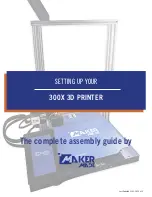
Pull sealing
tape back
Remove the plug
New
thumbwheel
Remove insert
The text in brackets refers to the corresponding user guide
chapter.
[Chapter Number]
TIP COMPATIBILITY
[2]
IDENTIFYING TIPS
[3]
PLATEN VACUUM
[4]
Make sure the vacuum indicator on the Operator Touchscreen
is green and showing that a small or large build sheet is in
place on the platen.
USING BUILD SHEETS
[4]
Use clear build sheet for ABS-M30, ASA, PC, and PC-ABS.
Use amber build sheet for PPSF and ULTEM.
Use green tinted build sheet for Nylon12.
INSTALLING CANISTERS
[4]
Remove the anti-rotation plug from side of canister before
use. Seal hole with sealing tape. Make sure the rubber
shipping insert is removed from the thumbwheel door
before building. Do not remove rubber shipping insert until
the canister is loaded into the canister bay.
Storing Canisters
Always replace the rubber shipping insert when
storing a partially used canister. Store canister
vertically (as if it is installed in a system) or
cross-winding of the filament on the inner
spool may result.
CHANGING TIPS OR MATERIAL TYPE
[4]
1. Remove the used build sheet from platen.
2. Clean the oven and tip wipe assembly.
3. Inspect the tip wipe assembly.
4. From the Build Screen, select
Material/Tools
and then select
Tips/Materials Change
. Follow the screen prompts to
change tips.
The Tip Wizard will guide you through the process.
108313-0009_REV_A
The system automatically does the following:
- Unloads model and support
- Waits for oven to stabilize
- Performs Auto Z Zero Calibration
- Performs Auto Tip Calibration
- Loads model and support material*
- Builds a Calibration Job*
* Requires button to be pressed by user and then user
placement to build the calibration box.
7. Select the circle next to the desired tip. A black dot in the
center indicates which tip is selected.
AUTO COOLDOWN FEATURE
[4]
This option acts as an energy saver when PC, PC-ABS, ULTEM, or
PPSF materials are being used. It also helps to prevent parts
from cracking when building large, thick parts using PPSF. After
building completes, the oven gradually cools to the standby
temperature. Wait until the PPSF parts are cool before removing
them from the oven. To use this feature go to the Administrator
screen, select
System Default
and then set
Auto Cool Oven
to On
or after the job.
STABILIZING OVEN
[4]
When changing material type or using Auto Cool-Down, allow
oven temperatures to stabilize before calibration and system
use. Oven stabilization times are as follows:
Table 1-3: Oven Stabilization Times
5. When changing liquefier tips.
Note: Worn tips cause part quality issues and can lead to loss of
extrusion. Always replace tips when prompted (reset
tip odometers).
Make sure
tip is fully
inserted into
block
6. When changing material type:
- Remove the canisters.
If removing a partially used
canister,
you must remove it immediately (within ten
seconds) after separating drive block from canister; otherwise
the filament is forced into the canister, making it unusable.
- Seal the canisters and store vertically.
- Insert new canisters and turn the thumbwheel to put
the canister in the “Ready”
state (flashing LED).
- If the removed tips are to be
re-used later, record material
type and volume.
- Make sure that you insert the
tip fully into the heater block.
Note: If material type is changed, the tips MUST be changed.
Do not use the same tip for different material types.
- Select
Review Materials to Load..
and choose materials to load.
- Select
Menu
to continue.
All unused model and support
tips are interchangeable -
EXCEPT for Soluble
Release (SR) support tips.
Once a tip is used, it is
committed to that material
type and is no longer
interchangeable.
Tip size is imprinted on
the top side of the plate
(T12, T14, T16, T20)
The Soluble Release
support tip is shorter
than standard tips.
Tip size is imprinted on
the top side of the plate
(T12SR20, T12SR30,
T12SR100).
QUICK REFERENCE CARD
Fortus 900mc
ABSi
Oven Stabilization Times (in hours)
ABS-
M30
ABS-
ESD7
Nylon
12
PC-
ABS
PC/
PC-ISO
ULTEM
9085
ABS-M30
Auto
Cooldown
Nylon 12
ASA
ABSi
Room temp.
ABS-ESD7
PC-ABS
PC/ PC-ISO
ULTEM 9085
ULTEM 1010
ASA
4 4 4 4 4 4
4 4 4 8 8 8
--- --- --- --- --- ---
--- 4 4 6 6
6
PPSF
PPSF
ULTEM
1010
ST130
ST130
--- --- --- --- --- --- --- 4 4 6 6
6
--- --- --- --- --- --- --- 4 4 6 6
6
--- --- --- --- --- --- --- 4 4 6 6
6
--- --- --- --- --- --- --- 4 4 6 6
6
4 4 4 4 4 4
4 4 4 4 4 4
6 6 6 6 6 6 6 4 4 --- 4
4
6 6 6 6 6 6 6 4 4 4 ---
---
6 6 6 6 6 6 6 6 4 4 ---
---
4 --- 4 6 6 6
4 4 --- 4 4 4
Nylon 6
Nylon
6
--- --- --- --- --- --- --- 4 4 6 6
6
Table 1-2: Slice Height
Model Tip
Slice Height
T12
0.007 in. (0.178 mm)
T20
0.013 in. (0.330 mm)
T14
0.010 in. (0.254 mm)
T16
0.010 in. (0.254 mm)
T20B
0.013 in. (0.330 mm)
T40
0.020 in. (0.508 mm)
Table 1-1: Available Tips
Material
Model Tip
Support Tip
ABSi
ABS-M30
ABS-M30i
ABS-ESD7
T12, T16, T20
T12, T16, T20
T12, T16
T12SR20
T12SR20 /
T12SR30
T12SR30
ASA
T12, T16, T20
T12SR30
Nylon 12
PC
PC-ABS
PC
PC-ISO
PPSF
ULTEM 9085
T1, T16, T20
T12, T16
T12, T16, T20
T16, T20
T12
T16
T16, T20
T12SR100
T12SR100
T12SR20
T16
T12
T16
T16
ULTEM 1010
T14, T20
T16
T40
T20B
ST130
T20B
T20
T40
T20
Nylon 6
T16, T20
T12SR100




















